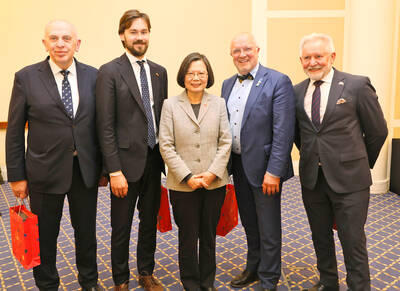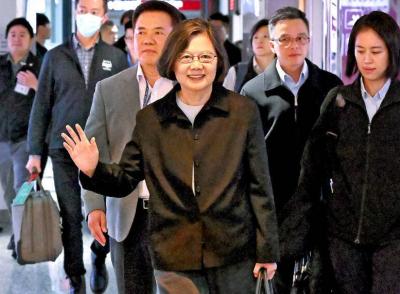People who lobby government officials for help will be required to register and publicly disclose their activities beginning on Friday, when the Lobbying Act (遊說法) goes into effect.
The Legislative Yuan passed the lobbying bill in July last year, making Taiwan the third country after the US and Canada to enact such legislation.
The law defines lobbying as any direct contact with lobbyable public officials, by verbal or written means, with the goal of influencing the official’s or his agency’s attitude toward the formation, enactment, passage, alteration or annulment of legislation, policies or initiatives. Lobbyists can be individuals, legal entities or civic groups soliciting help on their own behalf or individuals or corporations that lobby on behalf of others.
Lobbyable officials are elected or appointed public officials at national or local levels, including the president, vice president, elected representatives, heads of local governments and political appointees.
The legislation prohibits lobbying on matters related to national defense, foreign affairs, China policy, national security, civil servants’ duties or the activities of foreign governments or international nongovernmental organizations in Taiwan.
According to the legislation, agencies that are potential targets of lobbyists must designate a special unit or official to accept the lobbyists’ registration.
Within seven days of being approached, the officials should register with the designated unit or official to record the date, venue, method and content of the activity.
Lobbyists must also report lobbying expenditures to the concerned agencies by May 31 every year, and the concerned agencies should publicize financial reports quarterly.
Within three years of leaving office, the president, vice president, officials appointed by the president and heads of local governments cannot lobby, in person, through their proxies or on behalf of others, agencies that they served in during the five years before they left office.
Any foreign governments, legal persons or groups intending to lobby public officials must entrust a domestic lobbyist to do so on their behalf.
However, no individuals, legal entities or groups from China, Hong Kong or Macau are allowed to lobby Taiwanese public officials, regardless of whether they lobby directly or through proxies.
In addition, any persons who have been convicted of sedition, treason, graft, organized crime, fraud, embezzlement or breach of trust are forbidden from lobbying on others’ behalf.
Incumbent elected representatives and their associates cannot lobby for enterprises that they operate or those in which they have a stake of more than 10 percent.
Any undisclosed lobbying activities, violations of revolving door restrictions, and unlawful lobbying by elected representatives and their associates are punishable by fines of up to NT$2.5 million (US$82,000).
The National Teachers’ Association yesterday welcomed the imminent implementation of the act, saying that it would force lobbying activities to move in a more positive direction as the law requires open and transparent operations.
The John Tung Foundation, an anti-smoking group seen as one of the most effective nonprofit lobbying groups, also welcomed the legislation, but worried it would give commercial interests a greater edge in influencing legislation and policy-making.
Lin Ching-li (林清麗), a foundation official in charge of public affairs, said the requirements forcing lobbyists to register in advance and report their expenditures afterward would considerably increase the administrative costs of social welfare groups but have little impact on wealthier corporate interests, such as tobacco companies.
Lin was concerned moneyed interests would end up “crowding out” the voices of public interest groups.
Lin Lu-hung (林綠紅), a top aide to Democratic Progressive Party Legislator Huang Sue-ying (黃淑英) was also skeptical.
“There will be a big gray area between ‘lobbying’ and ‘written requests,’” the aide said, saying that lawmakers’ offices receive many written requests for help every day.
Since the Lobbying Act does not regulate written pleas from constituents, future lobbyists may use this option to make their case, which would force legislative aides to determine on their own if these documents constitute “lobbying” or are simple “requests for help,” she said.
If they were defined as “lobbying,” she said she wondered if that meant constituents would have to register their approach in advance.
“Just thinking about having to register help requests on behalf of others gives me a headache,” she said.

Former president Tsai Ing-wen (蔡英文) on Monday called for greater cooperation between Taiwan, Lithuania and the EU to counter threats to information security, including attacks on undersea cables and other critical infrastructure. In a speech at Vilnius University in the Lithuanian capital, Tsai highlighted recent incidents in which vital undersea cables — essential for cross-border data transmission — were severed in the Taiwan Strait and the Baltic Sea over the past year. Taiwanese authorities suspect Chinese sabotage in the incidents near Taiwan’s waters, while EU leaders have said Russia is the likely culprit behind similar breaches in the Baltic. “Taiwan and our European

The Taipei District Court sentenced babysitters Liu Tsai-hsuan (劉彩萱) and Liu Jou-lin (劉若琳) to life and 18 years in prison respectively today for causing the death of a one-year-old boy in December 2023. The Taipei District Prosecutors’ Office said that Liu Tsai-hsuan was entrusted with the care of a one-year-old boy, nicknamed Kai Kai (剴剴), in August 2023 by the Child Welfare League Foundation. From Sept. 1 to Dec. 23 that year, she and her sister Liu Jou-lin allegedly committed acts of abuse against the boy, who was rushed to the hospital with severe injuries on Dec. 24, 2023, but did not

LIKE-MINDED COUNTRIES: Despite the threats from outside, Taiwan and Lithuania thrived and developed their economies, former president Tsai Ing-wen said Former president Tsai Ing-wen (蔡英文) on Saturday thanked Lithuania for its support of Taiwan, saying that both countries are united as partners in defending democracy. Speaking at a reception organized by the Lithuania-Taiwan Parliamentary Friendship Group welcoming her on her first visit to the Baltic state, Tsai said that while she was president from 2016 to last year, many Lithuanian “friends” visited Taiwan. “And I told myself I have to be here. I am very happy that I am here, a wonderful country and wonderful people,” Tsai said. Taiwan and Lithuania are in similar situations as both are neighbors to authoritarian countries, she

Former president Tsai Ing-wen (蔡英文) is to visit the UK during her ongoing European trip, which originally included only Lithuania and Denmark, her office said today. Tsai departed Taiwan for Europe on Friday night, with planned stops in Lithuania and Denmark, marking her second visit to the continent since her two-term presidency ended in May last year. Her office issued a statement today saying that Tsai would also visit the UK "for a few days," during which she is to meet with UK politicians and Taiwanese professionals, and visit academic and research institutions. Following Tsai's stop in Denmark, she is to visit the